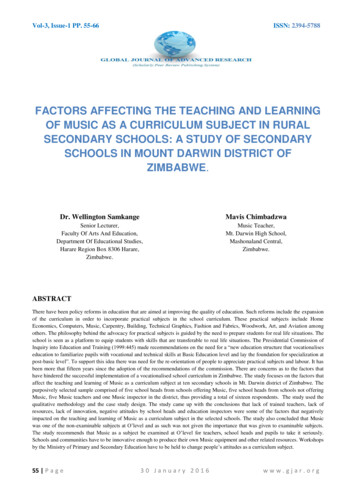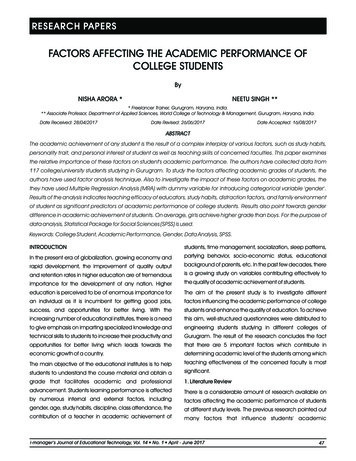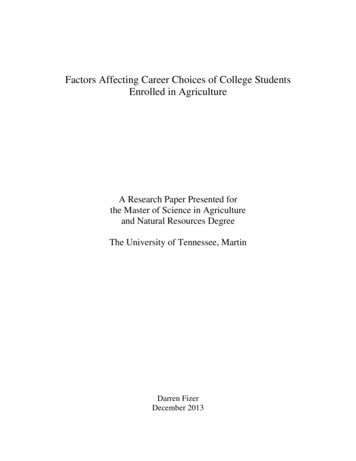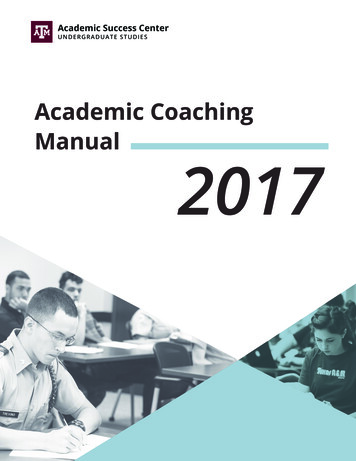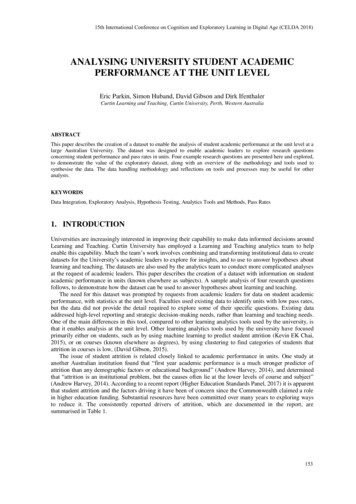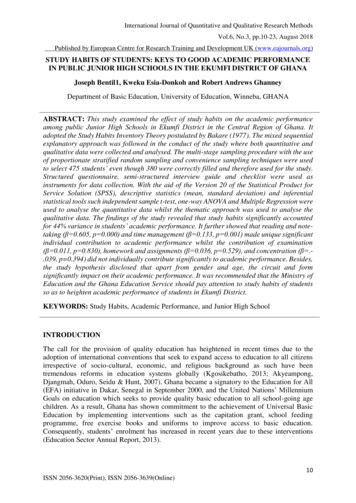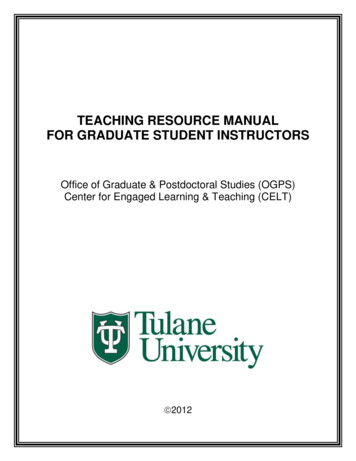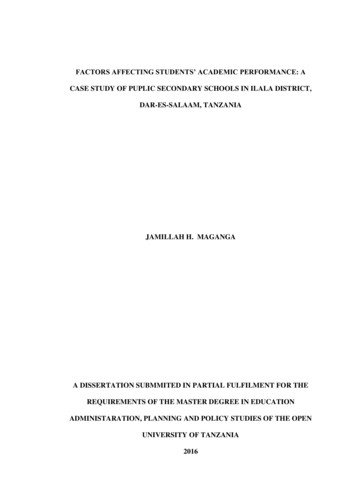
Transcription
FACTORS AFFECTING STUDENTS’ ACADEMIC PERFORMANCE: ACASE STUDY OF PUPLIC SECONDARY SCHOOLS IN ILALA DISTRICT,DAR-ES-SALAAM, TANZANIAJAMILLAH H. MAGANGAA DISSERTATION SUBMMITED IN PARTIAL FULFILMENT FOR THEREQUIREMENTS OF THE MASTER DEGREE IN EDUCATIONADMINISTARATION, PLANNING AND POLICY STUDIES OF THE OPENUNIVERSITY OF TANZANIA2016
iiCERTIFICATIONThe undersigned certifies that he has read and hereby recommends for acceptance bythe Open University of Tanzania a dissertation titled: Factors Affecting Students’Academic Performance: A case of Public Secondary Schools in Ilala District, Dar –es – Salaam. .Dr. Zacharia R. Rwejuna(Supervisor) .Date
iiiCOPYRIGHTNo part of this dissertation may be reproduced, stored in any retrieved system ortransmitted in any form by any means, electronic, mechanical, photocopying orotherwise without prior written permission of the author or The Open University ofTanzania on behalf.
ivDECLARATIONI, Jamillah Maganga, do hereby declare that, this dissertation is my own work and ithas not been submitted for any academic award in any other university for a similaror any other degree award. Signature Date
vDEDICATIONI dedicate this dissertation to my beloved late parents Ms. Mwajuma Mrisho Matwili(mother) and Mr. Haroun Mzee Maganga (father) who encouraged mewholeheartedly in my studies from primary school up to the master’s degree level.This work is also dedicated to lovely sons Haroun Massa, Harith Massa andAbdurRahim Massa
viACKNOWLEDGEMENTI am especially grateful and thank Almighty God for His gracious love and endlessblessings, without Him the entire dream of completing this dissertation would nothave been possible. This work is a product of collective efforts, dedication andsupport from various individuals. I convey special gratitude to my JamhuriSecondary School fellow Staff for their cooperation. I wish to express my heartfeltthanks to all of them for helping me to achieve my goal. Moreover, I would like toexpress my sincere gratitude to my supervisor, Dr. Zacharia R. Rwejuna whogenerously and tirelessly extended his expertise, guidance, aspirations andcontribution to shape the quality of this work. He made constructive criticisms,suggestions and comments that made this dissertation in its present form. Again, Iwould like to extend my special thanks to my family especially my beloved husbandAhmad Massa, my son Abdallah Massa, my daughters Zainab Massa, Zuhra Massa,and Fatma Massa who were patient during my studies, their encouragement, advicemoral and materials support were very important source of motivation to completemy studies. Also I would like to thank my brothers Mzee Maganga, Mrisho Magangaand Karim Maganga as well as my sisters Saadah Maganga, and Safina Maganga fortheir prayers and encouragement during undertaking of this study. Generally, mysincere gratitude is directed to anyone who, in way or another, assisted to make thisstudy a reality.
viiABSTRACTThe study focused on the factors that affect the academic performance in secondaryschools in Ilala district. The study was guided by the following research objectives:to relate how English capacity among the students affects the student academicperformance, to relate the how the teaching and learning facilities such as (textbooks, chemicals facilities) and the students’ academic performance in secondaryschools in Ilala District, and to establish how guidance and counseling affectacademic performance of students in secondary schools. The study employedqualitative research design. Interview, focused group discussion and documentarywere employed in data collection. The findings revealed that many learners could notmaster the English as (LOI), and they had very poor knowledge of vocabularies usedin various subjects, they had weak English capacity to the extent of failing to makegood and logical sentence in English. Altogether poor capability in English limitedtheir ability to understand concepts in various discipline like Geography, Physics andChemistry. Further, the results showed that with exception of arts textbooks, Sciencetextbooks were not enough in Ilala Secondary Schools.This limited effectivelearning of various discipline like Physics. The funding further indicated that theschools were experiencing problems of science on one side and interaction duringlearning of the other side. Schools were observed to skip formative evaluationbecause of high costs of stationeries. Lastly, the results showed that many schoolshad no counselors to counsel teens. The finding further indicated that even if teenswere pretending learning, they lost in between many hours for non academicactivities like charting on email, smart phones and they had poor concentration intheir studies. Recommendations to improve the academic performance are attached.
viiiTABLE OF CONTENTSCERTIFICATION . iiCOPYRIGHT . iiiDECLARATION . ivDEDICATION . vACKNOWLEDGEMENT . viABSTRACT . viiTABLE . xiiiFIGURE . xivLIST OF ABBRREVIATIONS. xvCHAPTER ONE . 11.0INTRODUCTION . 11.1Introduction. 11.1.1 Background of the study . 11.2Statement of the Problem. 31.3Purpose of the Study . 31.3.1 Objectives of the Study. 41.4Research Questions . 41.5Significance of the Study . 41.6Scope and Delimitations of the Study . 5
ix1.7Operational Definition of Terms . 51.8Conceptual frame work. 7CHAPTER TWO . 92.0LITERATURE REVIEW . 92.1Introduction. 92.2The Concept of Ordinary Secondary Education . 92.3Curriculum . 102.4Aims and Objectives of Secondary Education . 102.5Importance of having Ordinary Secondary Schools . 112.6Theoretical Literature Review . 112.6.1 The Role of English Command/Capacity in Influencing Students’ AcademicPerformance in Secondary School . 122.6.2 Effects of Teaching/Learning Facilities on School Performance . 162.6.3 School Guidance and Counseling and Students Academic Achievement . 162.6.4 Summary . 19CHAPTER THREE . 203.0RESEARCH METHODOLOGY . 203.1Introduction. 203.2Research Design . 203.3Limitations of Qualitative . 22
x3.4Location of the Study. 233.5Target Population. 233.6Data Collection Methods . 253.6.1 Interview . 253.6.2 Focus Group Discussion (FGD) . 253.6.3 Documentary Review . 263.6.4 Justification of Interview Method . 263.6.5 Validity and Reliability. 273.7Data Analysis Techniques . 283.8Ethical Consideration. 293.9Summary of the Chapter . 29CHAPTER FOUR . 304.0DATA PRESENTATION AND ANALYSIS. 304.1Introduction. 304.1.1 English Ability among Students and Academic Performance in IlalaSecondary Schools . 304.2Effects of the Teaching and Learning Resource on the AcademicAchievement . 324.2.1 Text Books and Academic Performance in Ilala Secondary Schools. 324.2.2 Science Laboratories and the Academic Performance in Ilala SecondarySchools. 33
xi4.2.3 Classrooms Congestions and the Student Learning In Ilala SecondarySchools. 344.2.4 Stationeries and Academic Performance in Ilala Secondary Schools . 354.3Effects of Counseling Practice on the Students’ Academic Performance . 36CHAPTER FIVE . 385.0DISCUSSION OF THE FINDINGS . 385.1Introduction. 385.2The English Capacity among Students and AcademicAchievement/Performance . 385.3The Effects of Teaching and Learning Resources on the AcademicPerformance . 405.3.1 Textbooks and Academic Performance . 405.3.2 Science Laboratories and Academic Performances . 415.3.3 Classroom Congestion and Academic Performance. 425.3.4 Stationeries and Academic Performance in Ilala Secondary Schools . 435.3.5 The Effects of Guidance and Counseling Practice on the Student AcademicAchievement in Ilala District . 43CHAPTER SIX . 466.0SUMMARY, CONCLUSION AND RECOMMENDATIONS . 466.1Summary . 466.2Summary of Findings . 46
xii6.3Implications of the Findings . 476.4Conclusion . 486.5Recommendations. 496.6Areas for Further Research . 50REFERENCES . 51APPENDICES . 55
xiiiTABLETable: 1.1:Poor Academic Performances of Four Secondary Schools2013-Ilala District . 3
xivFIGUREFigure 1.1:Conceptual Framework for Studying Factors Affecting Students’Academic Performances in Secondary Schools . 8
xvLIST OF ABBRREVIATIONSBAKITABaraza la Kiswahili TanzaniaCSEECertificate of Secondary EducationFGDFocus Group DiscussionLoILanguage of InstructionNECTANational Examination Council of TanzaniaSEDPSecondary Education Development Plan
1CHAPTER ONE1.0 INTRODUCTION1.1IntroductionSchools, colleges and universities have no worth without students. Students are mostessential asset for any educational institute. The social and economic development ofthe country is directly linked with students’ performance. The students’ performance(academic achievement) plays an important role in producing the best qualitygraduates who will become great leader and manpower for the country thusresponsible for the country’s economic and social development (Ali et al, 2009).Academic achievement is an apparent phenomenon in many developing countrieslike Tanzania since is measured in final examination (FormFour NationalExamination), whereby success is measured by academic performance or how wellstudents meet standards set out by the National Examination Council (NECTA) andthe institute itself. Students’ performance at the level of secondary has the strongimpact on other levels of higher and tertiary education. The chapter includes anexplanation on why this topic will be important, research problem, the purpose andsignificance and the specific research questions along with the delimitations of thestudy.1.1.1 Background of the StudyMosha, (2014) said that, students’ performance was affected by shortage of Englishteachers and absence of teaching and learning materials. However, her findingsshowed that, the presence of untrained, under-qualified and trained teachers who are
2incompetent resulted to skip teaching some difficult topics in the syllabus andstudents’ infrequent use of English language at school and home, large class size,teachers’ responsibilities, poor conducive teaching and learning environment in theclassrooms, limited home support environment and poverty are among the factorsthat affecting students’ academic performance in English Language. Students’ effort,previous schooling (Siegfried &Fels, 1976; Anderson & Benjamin, 1994), parents’education, family income (Devadoss& Foltz, 1996), self motivation, age of student,learning preferences (Aripin, Mahmood, Rohaizad, Yeop, & Anuar, 2008), classattendance (Romer, 1993), and entry qualifications as factors that have a significanteffect on the students’ academic performance in various settings. Ali Shoukat at el,said that the factors affecting academic performance are gender, age, schooling,father/guardian social economic status, residential area, medium of schooling, tuitiontrend, daily study hours and accommodation trend are the factors affecting academicperformance.Graetz (1995) conducted a study on study on socio- economic status of the parentsof students and concluded that the socio economic background has a great impact onstudent’s academic performance. Pedrosa et. al (2006) in their study on social andeducational background pointed out those students who mostly come from deprivedsocio-economic and educational background performed relatively better than otherscoming from higher social-economic and educational area. Eamon (2005) “Thosestudents usually come out from low socio-economic status or area show lowperformance in studies and obtained low scores as compared to the other students ortheir counter parts”.
31.2Statement of the ProblemPerformance in public schools is something which everyone expects to be of higherquality because of the roles the sector plays to provide service to the community, onthe other hand those who failed to perform better cannot contribute well to thehuman resources because they don’t have skill needed. Despite of its importance, thishas not been implemented effectively thus, many public schools still lack improvedperformance. See table 1.1 that for the four schools the students who sat for the formfour examinations in 2013, more than 81.3% scored poor grades (division four andzero). This is alarming and it indicates that school performance in schools is poor.The poor achievements in examinations among public secondary students inTanzania reflect superficial and temporary knowledge. In last decade achievementsin examinations in public secondary schools in Tanzania, Ilala district inclusive havebeen poor. The low achievements are related to the challenges listed.Table: 1.1Poor Academic Performances of Four Secondary Schools 2013-IlalaDistrict2013201320132013Source:1.3Div 1Div 2Div 3Div 4FailJuhudi sec41837130161Mnazi Mmoja 191%4.7%12.9%39.3%42.0%National Examination Council of Tanzania CSEE results (NECTA) 2013Purpose of the StudyThe general purpose of the study was to assess the factors affecting students’academic performance in Ilala district.
41.3.1 Objectives of the StudyThe study intended to achieve the following specific objectives:i)To access how LoI affect the student’s academic performance in Ilala districtsecondary schoolsii)To examine if teaching and learning facilities such as (text books, laboratoryequipments) affect students’ academic performance in secondary schools inIlala district, andiii)To establish how guidance and counseling affect academic performance ofstudents in secondary schools in Ilala district.1.4Research QuestionsThe study is guided by the following research questions:i)What is the influence of LoI on students’ academic performance in selectedsecondary schools in Ilala district?ii)How status of learning and learning farcicalities affect students’ academicperformance in Ilala secondary schools?iii)Is there any relationship between guidance and counseling services andstudents’ academic performance in Ilala district secondary schools?1.5Significance of the StudyThe study intends to investigate on the factors cause poor academic performancesuch as students’ low ability to use English in communication in the lessons. This isvery useful feedback to curriculum planners to review the proper use of language inteaching in secondary schools. The study may provide feedback on the status of
5teaching and learning facilities such as, chemicals, textbooks, chalks, laboratoryequipments. The feedback may guide the Ministry to improve its resources allocationin secondary schools aiming at improving the quality of education in schools. Thestudy may provide feedback on the status of guidance and counseling as a componentneeded to support students growth through effective use of time, decision makingand hence good performance among secondary schools students. The study expectsto bring useful insights on which to build, modify or improve the ways ofteaching/learning in Tanzania context.On other hand, the study is important for educational stakeholders including :Researchers, Politicians, Heads of Schools , Teachers, Parents of the Students as wellas, Educational Planners in planning for improving the quality of education insecondary schools.1.6Scope and Delimitations of the StudyThe study was confined to public secondary schools in Ilala District. The privateschools were not included because they would not be free to share confidentialinformation. However, every effort was made to ensure that sampling used wasadequate to collect information required for drawing conclusions. Head of schools,Teachers, and form four students preferred by the researcher as the main respondentsbecause they were the direct consumers of the researcher’s concern.1.7Operational Definition of TermsStudent: Is a learner, or someone who attends an educational institution.
6Students’ academic performance: The outcomes of the teaching and learningprocess in terms of knowledge and skills in students acquires from schools asmeasures by scores obtained in Certificate for Secondary Examinations (CSEE).Academic performance: Refers to achievement in standardized tests orexaminations shown by a student. According to Niebuhr (1995) Academicperformance of students is typically assessed by the use of teacher’s ratings, tests,and examinations.Counseling: This refers to a process that uses the safety of a special relationshipbetween the counselor and the counselee together explore the thoughts, feelings andcounselor attitudes of the counselee with the objective of tapping the resourceswithin the counselee to effect healing and change.Guidance: Refers to all activities rendered by educational institutions, which areprimarily concerned with assisting individual students understand themselves, thustheir needs, interest abilities and potentials.Teaching and learning materials: In this study teaching and learning materialsmean all materials that facilitate the teaching and learning in secondary schools.They include laboratories with its chemical and equipment, text books used forteaching by the teachers and those used by the students for reference. Other materialsare projectors, classrooms, desks, libraries as well as syllabus. Big charts, wall maps,photographs are also teaching and learning materials (Mbunda, 2006).
7Performance: To perform is to take a complex series of actions that integrate skillsand knowledge to produce a valuable result.Secondary school: Is a school which provides secondary education after primaryschool education.Language of instruction: This refers to the language of instruction which is used toimplement the school curriculum in schools mainly the language of instruction isEnglish.1.8Conceptual frame workThe study literature has indicated that students in secondary schools are notperfuming well due to various reasons. This study further takes steps to investigateon some problem with focus to Ilala District Secondary Schools. The variables to beinvestigated are English among learners, teaching and learning materials in schools,and status of guidance and counseling in those schools. This variables have beingidentified because the researcher hopes that by analyzing this variables the deepinsides on the factor for student poor performance can be revealed, thus guidetowards improvement of secondary school performance in terms of academic inthose schools.
8Pooracademicperformance in CSEE2013 IlalaDistrictNationalExaminationresults verypoor CSEE2013 in fourschools 81%failedFigure usWeakvocabulariesFailure tocomprehendword meaningPoorunderstandingof demand ofthe questionsPoorcomprehensionabilityShortage oftext bookAbsence oflaboratoriesClassroomcongestionsHigh cost ofstationeryNo counselorsNo counselingprogrammesStudents notcounseled inacademicissuesPoor rformancein schoolsAttain Dakareducationalframework2000 andattain EFAConceptual Framework for Studying Factors Affecting Students’Academic Performances in Secondary Schools
9CHAPTER TWO2.0 LITERATURE REVIEW2.1IntroductionA number of studies have been carried out to identify and analyse the numerousfactors that affect students’ academic performance in various centres of learning.Their findings identify students’ effort, previous schooling (Siegfried &Fels, 1979;Anderson & Benjamin, 1994), parents’ education, family income (Devadoss& Foltz,1996), self motivation, age of student, learning preferences (Aripin, Mahmood,Rohaizad, Yeop, &Anuar, 2008), class attendance (Romer, 1993), and entryqualifications as factors that have a significant effect on the students’ academicperformance in various settings.Parent involvement is another factor that has been consistently related to a child’sincreased academic performance (Hara& Burke, 1998; Hill & Craft, 2003; Marcon,1999; Stevenson & Baker, 1987). While this relation between Parent involvementand a student’s academic performance is well established. This chapter covered theliterature on the factors affecting students’ academic performance. Therefore, thechapter covers how communication skill affect students academic performance, howstatus of teaching/learning facilities affect students academic performance and howguidance and counseling services affect students’ academic performance.2.2The Concept of Ordinary Secondary EducationThis is the third level education in which the students are enrolled after successfulcompletion of seven of Primary Education. Students shall spend four years of studies
10in Ordinary Secondary Education. In Tanzania Ordinary Secondary Education isprovided by both the public sector and private sector.2.3CurriculumThe curriculum of secondary education consists of optional subjects plus core andcompulsory subjects. All schools offer core and compulsory subjects in Form Oneand Two, subjects include: Mathematics, English, Kiswahili, Civics, History,Geography, Physics, Chemistry, Biology and religion. The optional subjects in FormOne and Two include: Home Economics, Information and Computer studies,additional Mathematics, Music, Fine arts, French, Arabic, other Foreign Languages,Islamic studies, Bible knowledge, and Physical education.2.4Aims and Objectives of Secondary EducationMinistry of Education and Vocational Training (2007) outlined seven objectives ofsecondary education in Tanzania as follow: to consolidate and broaden the scope fbaseline ideas, knowledge, skills and principles acquired and developed at theprimary level; to enhance further development and appreciation of national unity,identity and ethic, personal integrity, respect for and readiness to work, human rights,cultural and moral values, customs, traditions and civic responsibilities andobligations; to promote the development of competency in linguistics ability andeffective use of communication skills in Kiswahili and in at least one foreignlanguage; to provide opportunities for the acquisition of knowledge, skills, attitudesand understanding in prescribed or selected fields of study; to prepare students fortertiary and higher education, vocational, technical and professional training; to
11inculcate a sense and ability for self –study, self-confidence and self advancement innew frontiers of science and technology, academic and occupational knowledge andskills; and to prepare students to join the world of work.2.5Importance of having Ordinary Secondary SchoolsThe Government of Tanzania saw the importance of developing secondary schools asan entry point to producing citizens who can compete in free market economy. Inspite of the effort made by the Government through PEDP and SEDP there is aincrease rate from primary schools to secondary schools, still there is a problem inquality of education provided to the students. The evidence is shown by the declinein the students’ academic performance. According to Galabawa et al (2008) there isdeterioration of secondary education in community schools in Tanzania since there ispoor system of controlling supply of text books used in schools, poor method ofinstruction that fosters rote learning, lack or absence of libraries and laboratories inschools. Therefore, analysis of secondary school learning environment may help toidentify specific issues related to learning environment to students that need to beaddressed to improve academic performance of students in ordinary certificateexaminations.2.6Theoretical Literature ReviewA review of prior, relevant literature is an essential feature of any academic project,An effective revie
wholeheartedly in my studies from primary school up to the master’s degree level. . to relate how English capacity among the students affects the student academic performance, to relate the how the teaching and learning facilities such as (text . graduates who will becom

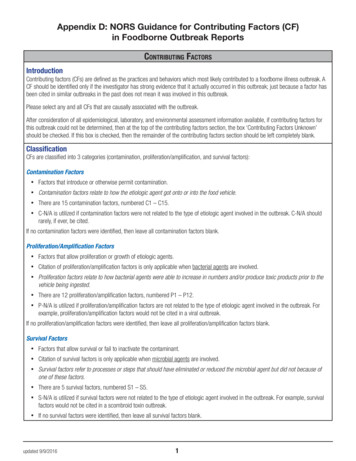
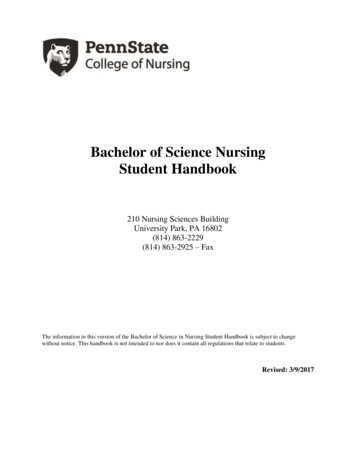
![05[2] Strategy competitors, competitive rivalry .](/img/2/052-strategy-competitors-competitive-rivalry-competitive-behavior-and-competitive-dynamics.jpg)
